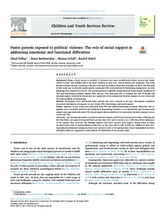ABSTRACT
Background: Being a foster parent is stressful. It becomes even more stressful when foster parents face major threats to their own families and to the foster children in their care, such as during war situations. This study focuses on foster parents' reactions to the war with Gaza in southern Israel that took place in 2014. The first goal of this study was to describe posttraumatic symptoms (PTS) and problems in functioning among foster parents following their exposure to the war. The second goal was to identify background and social support predictors of PTS and functioning problems among these parents. The third goal was to examine the role of formal and informal support received by the parents as a moderator of the association between exposure to war events and PTS and problems in functioning.
Methods: Participants were 354 Israeli foster parents who were exposed to the war. Participants completed structured instruments of exposure to war events, PTS, functioning, and social support.
Results: Exposure to war events was associated with PTS and related functioning problems. Education and religiosity were correlated with PTS and problems in functioning. Contrary to our hypothesis, more formal social support was associated with more PTS. Social support did not moderate the association between exposure to war events and PTS.
Discussion: The unexpected positive correlation between support and PTS was interpreted as either reflecting the fact that foster care agencies targeted foster parents who were most in need, or as a reflection of the inadequacy of the support they received. The findings indicate that foster parents need support during times of major stressful events such as natural disasters and wars, so that they will be able to help the children in their care. Specialized professional training for foster care workers needs to be implemented. Future longitudinal and mixmethods studies are suggested to help address the limitations of the present study.

